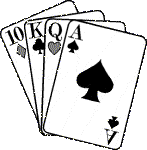What happens when you don't express your feelings?
The answer to the above question depends primarily on the nature of the relationship you are trying to establish. If you do not have, or want, any degree of intimacy in a relationship, then nothing may happen. If on the other hand, you want more than a casual relationship, and want to be personally involved, then withholding feelings can be quite counter productive. As a rule of thumb: The more important the relationship is to you, and the more you want out of it, the more necessary it is to be open and honest in the expression of your feelings.
Anthropologist Ray Birdwhistell [1] was one of the first to note how we use body
language in communicating. He coined the term kinesis to refer to this
process. Whether you like it or not, your body may not lie. It has been
estimated that in a normal conversation that about one third of the
communication is done on a verbal level, whereas two thirds is done on a
nonverbal level.
You may have noticed that sometimes when you are feeling
depressed that you tend to walk more slowly. You may have noticed that you have
slammed doors and thrown things around when you are angry. Being sensitive to
body language is a good way to pick clues as to how a person feels. Pitch, tone
of voice, and rate of speech can also give us important information about the
speaker. For example, research indicates that speakers who increase loudness and
rate of speech are viewed as more active and dynamic than those who speak more
softly.
You may have noticed that when you look at someone and then look away you make one kind of statement. In practically every interaction Julius Fast has called this a moral looking time, i.e., the amount of time that we can look at someone without being accused of being aggressive or intimate. Body language signals can be a help or hindrance. A lot depends upon knowing the person in order to be certain of the cues. The following have often been associated with anger and anxiety: Cold hands, yawning, foot tapping, gum chewing, tight shoulder muscles, arms folded across the chest.

Try your hand at expressing your feelings and see what happens. Pair off with
your family, or friends. Pay particular attention to how people express their
feelings nonverbal. Is there any relationship between the person who won and how
effective the person was in expressing feelings?. What did you learn from
this experience? Be sure and provide details with your answers such as :. Who
played? When did you play the game? Who won? Did you win or lose?
Take a regular deck of playing cards. Deal out all the cards but leave three in the draw deck. The winner is the person who gets rid of all the cards first. Members take turn expressing feelings (non-verbally) according to cards designated as follows: 2= contentment, 3=shyness, 4=indifference, 5=fear, 6=frustration, 7=loneliness, 8=sorrow, 9=anger,10=hope, Jack=happiness, Queen=joy, King=warmth, Ace=love, Joker=admiration The game is similar to the card game charades, as each person acts out the feeling expressed on the card.
The first designated player to begin, who sits on the
left side of the dealer, selects a card to be expressed and places it face down.
Other players guess at the expression and place their cards face down. The cards
are then placed face up. The players with correct cards discard theirs to the
draw deck. Players with the incorrect cards draw as similar number from draw
deck as a penalty and place them in their hand. The game continues until a
winner emerges.[3]
![]()
1. R .L. Birdwhistell, Introduction to Kinesics, Louisville, Ky. University of
Louisville, Press, Foreign Services Institute, 1952
2. Julius Fast, J.
"Eyes Have a Language of Their own, " Family Health, April 1979, page 23-25
3. David W. Johnson, David,
Reaching Out: Interpersonal Effectiveness and Self
Actualization,
Boston: Allyn and Bacon 2003, p.204
E-mail:
rbrehm@msn.com
Copyright © 1998 [Robert Brehm]. All rights reserved.